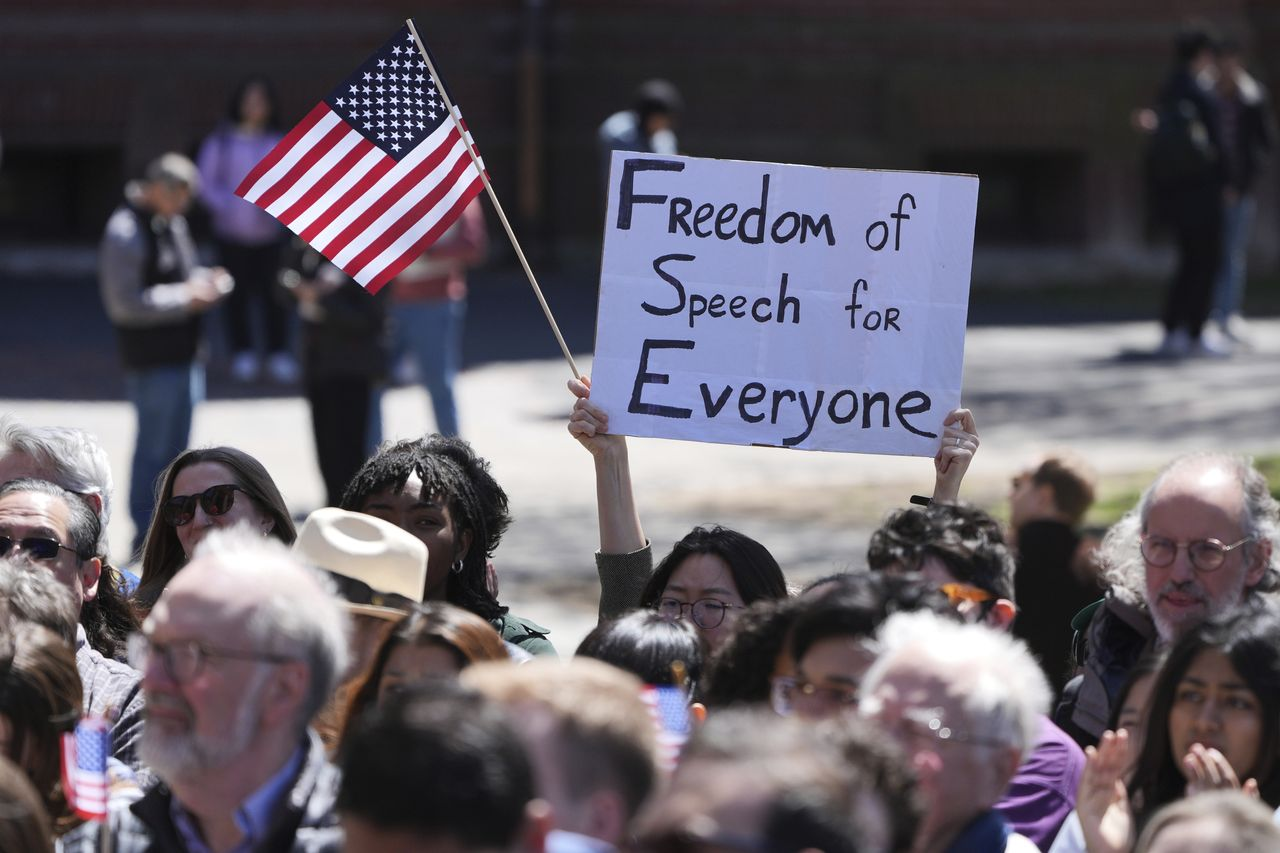Harvard University, one of the most prestigious academic institutions in the world, has long been a beacon of knowledge and innovation. However, recent demands from the Trump administration have raised significant concerns about the University’s independence and future funding. With potential losses of up to $9 billion in research support on the line, Harvard’s leaders are adamant that the institution will not compromise its constitutional rights or educational mission. This episode emphasizes crucial issues such as government funding and universities, the implications of such funding on academic programs, and the battle against antisemitism on campus. As Harvard navigates these challenges, it continues to assert its commitment to fostering an independent educational environment, free from external coercion.
The esteemed institution, Harvard University, faces unprecedented pressures as it strives to maintain its academic freedom amid governmental scrutiny. In light of recent controversies, notable threats to its research funding highlight the intersection of higher education and federal oversight. This situation not only encapsulates concerns surrounding university autonomy but also sheds light on broader discussions about research funding issues and its implications for academic institutions nationwide. In addition, the ongoing dialogue around the presence of antisemitism on campuses serves to underscore the multifaceted challenges that universities like Harvard are currently confronting. As Harvard and similar entities navigate these turbulent waters, the enduring quest for institutional independence and a commitment to scholarly inquiry remains paramount.
Harvard University and Government Funding Pressures
In recent times, Harvard University has found itself at the center of a heated debate regarding government funding and academic independence. The Trump administration’s demands have injected tension into the relationship between the federal government and elite institutions, raising concerns about the autonomy of higher education. Harvard’s leadership has increasingly voiced its commitment to maintaining institutional independence, asserting that any government attempts to dictate the curriculum or admissions policies are rooted in overreach. The rejection of such demands demonstrates a clear stance on preserving the university’s mission to foster free inquiry and innovation without external influence.
The implications of these funding pressures extend far beyond the walls of Harvard. Universities across the country are increasingly facing similar threats as federal funding becomes a tool for enforcing compliance with political agendas. This situation raises significant questions about the future of academic freedom in the United States. As prominent researchers and educators warn, any loss of government support could have dire consequences not only for universities’ financial sustainability but also for the innovation ecosystem that benefits society at large. The broader concern is that government funding, when tied to political conditions, can stifle the creative and independent spirit that is essential for academic institutions to thrive.
The Impact of Antisemitism on Campus
In the wake of rising tensions, Harvard University has been proactive in addressing concerns regarding antisemitism on campus, particularly during the ongoing conflict related to the Gaza war. Harvard President Alan Garber emphasized that the university is committed to protecting all students, including those from Jewish backgrounds, against discrimination and harassment. He outlined a series of initiatives aimed at fostering understanding and inclusivity within the student body. These measures reflect a broader acknowledgment of the responsibility universities hold in cultivating a campus climate that is safe and welcoming for all.
As the Trump administration highlights what it perceives as failings in managing antisemitism, the focus on campus dynamics serves to amplify the ongoing discourse about university governance. The challenge lies in balancing robust academic freedom with the need to create an environment where all students feel valued and protected. Harvard’s approach also necessitates ongoing dialogue about how to address incidents of bias without compromising the institution’s dedication to free speech and open discussion. This complex interplay calls for innovative strategies that can uphold university values while simultaneously defending against discrimination.
University Independence vs. Government Control
Harvard’s resistance to government control echoes a broader narrative within U.S. higher education where independence is paramount. The tension between universities and the government often revolves around the balance of support and autonomy. Harvard’s rejection of the Trump administration’s demands reinforces the need for universities to stand firm against external interference in their operations and ideologies. This commitment to preserving independence not only aligns with fundamental American values but also underscores the critical role universities play in maintaining a diverse range of viewpoints and academic freedom.
In refusing to comply with demands perceived as intrusive, Harvard reflects a growing trend among universities that prioritizes independence. This stance is crucial as academic institutions face scrutiny regarding their governance structures and the extent to which they allow for independent research and instruction. With state and federal funding at stake, the challenge becomes maintaining robust educational environments while navigating the complexities of compliance with governmental regulations. Institutions must advocate for their right to operate independently, recognizing that this autonomy is foundational to their mission and effectiveness in fostering innovation.
Research Funding Challenges Affecting Universities
The ongoing disputes regarding government funding, particularly under the Trump administration, raise notable questions about the future of research at institutions like Harvard. The proposed freezing of substantial funding threatens to disrupt the extensive collaborations that drive scientific and technological advancements. Research funding plays a pivotal role in fueling innovation, and any reduction or freeze could have catastrophic effects on the discovery of new drugs, technologies, and methodologies that stem from academic research. As highlighted by Harvard’s administration, the potential loss of funding highlights the interconnectedness of university research and broader societal benefits.
Furthermore, as research initiatives at Harvard represent a significant portion of the $9 billion in federal funding tied to innovation, the university’s commitment to addressing research funding issues becomes increasingly critical. The competitive landscape of global research is under threat, especially as international rivals, such as China, continue to invest heavily in their institutions. It is essential for U.S. universities to maintain robust funding streams to ensure they remain leaders in research and development. The collaboration between government and academia has historically led to breakthroughs that improve lives, create jobs, and drive economic growth. Therefore, the protection of this ecosystem is vital for maintaining U.S. competitiveness in innovative sectors.
Political Influence on Academic Institutions
The current political landscape poses significant challenges for academic institutions, particularly concerning the influence of governmental policies on university governance. The Trump administration’s interventions have spotlighted the fragility of university independence amid shifting political priorities. Political influence over decisions related to funding and governance structure can create a chilling effect on academic freedom. This dynamic exacerbates concerns about the role universities play in nurturing diverse viewpoints and critical thinking, particularly in contentious areas of study. Harvard’s staunch refusal to submit to political demands not only signals resistance but highlights the necessity of upholding academic integrity.
Critics warn that political pressures can lead to self-censorship among academics, undermining the core principles of inquiry and debate. The importance of universities being the custodians of free thought becomes even more pronounced in this context. By defending against governmental encroachment, institutions like Harvard uphold their roles as incubators for new ideas and advocates for societal reform. Moreover, ensuring political neutrality in academic affairs safeguards the critical dialogue necessary for addressing complex societal issues and fosters an environment where all ideas can be explored without fear of retribution.
Ensuring Academic Freedom in the Face of Adversity
Academic freedom has become a pressing issue as universities navigate the double-edged sword of compliance with government regulations while preserving their mission of inquiry and critical thought. Harvard University serves as a pivotal case study in this discussion. Under the Trump administration’s proposed changes that threaten not only funding but also academic independence, Harvard has responded resolutely by emphasizing its commitment to the values of inquiry and freedom of expression. The implications of such a stance extend not only to Harvard but also to the broader academic community, underscoring the necessity for universities to advocate for their rights and autonomy.
As the university affirms its stance against external pressures, the need for sustained dialogue surrounding academic freedom becomes paramount. Ensuring that scholars can pursue research without fear of political repercussions is crucial in maintaining the integrity of higher education. Through initiatives aimed at promoting an environment where diverse ideas can flourish, Harvard demonstrates the importance of preserving academic spaces free from external influences. This commitment is essential not only for the future of the university but also for the advancement of society as a whole.
The Role of Universities in U.S. Innovation
Universities, particularly prestigious institutions like Harvard, have long been instrumental in driving innovation through research and collaboration. The connection between governmental funding and university research has historically resulted in groundbreaking advancements that benefit society across various domains. Harvard’s leadership has emphasized the significance of maintaining robust partnerships with federal agencies to support inventions and discoveries rooted in academic research. As federal funding becomes more politicized under current administrations, the potential risk to American innovation and competitiveness escalates.
The need for universities to engage collaboratively while remaining independent is critical as they navigate these funding challenges. Harvard’s research initiatives not only yield inventive products and solutions but also contribute to a trained workforce that propels economic growth. The loss of funding or withdrawal of support from the government underlines a pivotal threat to this integral relationship. As American institutions seek to maintain their leadership in global innovation, they must advocate for a funding model that respects academic independence while ensuring the continuation of vital research.
Challenges of Diversity in Academia
As universities like Harvard confront the complexities of academic freedom, a major challenge remains the promotion of diversity and inclusion within their campuses. The call for broadening intellectual and viewpoint diversity resonates in the context of how institutions respond to criticisms related to representation and equity. In a landscape where student bodies are increasingly diverse, the ability of universities to foster an inclusive environment is essential for their success in educating future leaders. The ongoing discourse surrounding antisemitism, particularly in relation to certain political challenges, underscores the need for universities to remain vigilant in nurturing an atmosphere of respect and understanding.
Harvard has taken significant steps to address concerns related to diversity while navigating the implications of external pressures. By promoting initiatives that celebrate multiculturalism and encourage open dialogues about difficult topics, the university upholds its commitment to inclusivity. The importance of supporting various perspectives becomes especially critical when considering the responsibilities of educational institutions in shaping societal attitudes. Ensuring that diverse voices are heard not only enhances the academic environment but also prepares students to engage effectively in a globalized society.
The Future of Higher Education Amid Political Turmoil
The landscape of higher education is rapidly evolving, particularly in the face of increasing political turmoil and pressures from regulatory bodies. Institutions like Harvard University highlight the complexities of navigating funding, governance, and academic freedom in an environment that often appears fraught with challenges. As political influence creeps into academic affairs, the potential consequences for universities could be transformative; academic standards and institutional integrity could both be compromised. The resilience displayed by Harvard in rejecting external demands illustrates a pivotal moment where the rights and values of academic institutions are tested.
Looking forward, the future of higher education hinges on the ability of universities to advocate effectively for their independence and uphold their core missions. As funding dynamics continue to shift, universities must engage proactively with policymakers to ensure that the balance of support does not overshadow their obligations to academic freedom. Only through strong advocacy and commitment to institutional values can universities like Harvard continue to fulfill their roles as bastions of knowledge and innovation, shaping the future workforce and addressing critical issues head-on.
Frequently Asked Questions
How does Harvard University maintain its independence amid demands from the Trump administration?
Harvard University is committed to its independence, as emphasized by President Alan Garber, who stated that the University will not comply with pressures from the Trump administration that threaten its constitutional rights and autonomy. This stance protects Harvard’s ability to determine its own academic programs and governance without undue influence from external forces.
What impact do research funding issues from the Trump administration have on Harvard University?
The Trump administration’s demands could jeopardize up to $9 billion in research funding for Harvard University. This funding is crucial not only for Harvard’s research initiatives but also for broader medical and scientific advancements that benefit society, underscoring the importance of supporting independent academic inquiry.
How is Harvard University addressing concerns regarding antisemitism on campus?
Harvard University actively addresses antisemitism through a series of measures implemented over the past 15 months. President Garber emphasized that the University is committed to fighting discrimination and ensuring a safe environment for all students, including Jewish students, responding to claims made during the Trump administration’s scrutiny.
What are the risks of government funding on universities like Harvard in the wake of the Trump administration’s actions?
Government funding is vital for universities like Harvard, especially for research and innovation. The Trump administration’s threats to freeze research funding pose significant risks to ongoing projects and future advancements in healthcare and technology, which could negatively impact U.S. leadership in these fields.
What steps has Harvard University taken to comply with recent changes imposed by the Trump administration?
In response to the scrutiny from the Trump administration, Harvard University has adhered to the Supreme Court decision ending race-conscious admissions while striving to enhance intellectual and viewpoint diversity on campus. The University maintains that it will define and undertake necessary changes independently without compromising its educational mission.
| Key Point | Details |
|---|---|
| Harvard’s Independence | Harvard University refuses to comply with demands from the Trump administration that threaten its autonomy and funding. |
| Funding At Risk | The Trump administration’s demands are linked to a potential loss of $9 billion in research funding for Harvard. |
| Claims of Antisemitism | The administration has criticized Harvard for its handling of antisemitism on campus. |
| Historical Contributions | Government-university partnerships have historically driven innovation and economic growth. |
| Impact of Research Funding Loss | Experts warn that withdrawal of research funding could severely impact American innovation and leadership in biotechnology. |
| Freedom of Inquiry | President Garber emphasizes the importance of preserving academic freedom and independent thought. |
Summary
Harvard University is facing critical challenges as it stands firm against the Trump administration’s demands that threaten both its funding and independence. The University’s leadership, particularly President Alan Garber, has articulated a strong commitment to academic freedom, asserting that governmental influence should not dictate the operations or educational pursuits of private institutions like Harvard. This situation underscores broader implications for academic institutions across the nation, raising concerns about the future of research funding, innovation, and the role of universities in society. As Harvard University navigates these complexities, it exemplifies the vital need to uphold the principles of free inquiry and resist external pressures that may compromise educational integrity.



